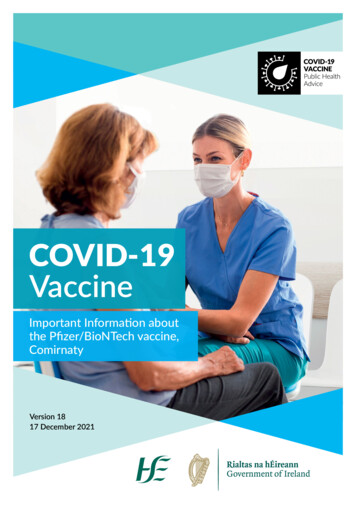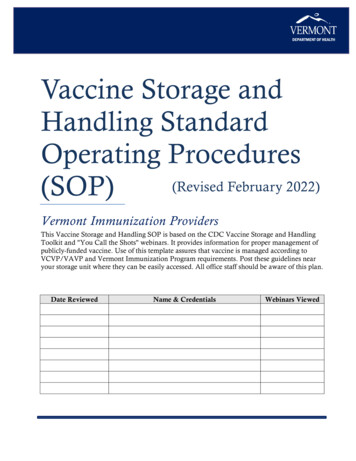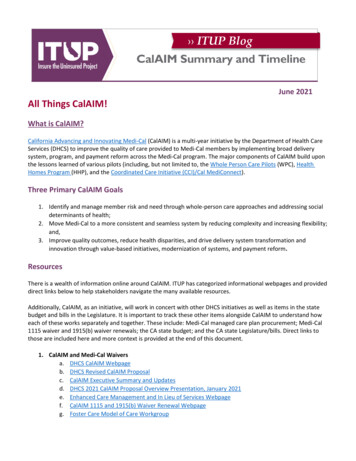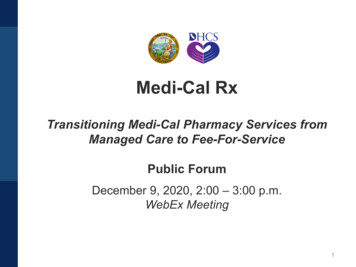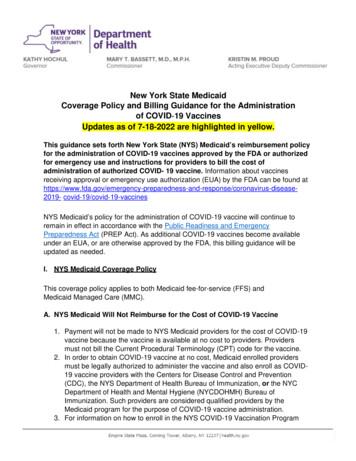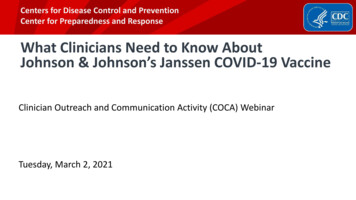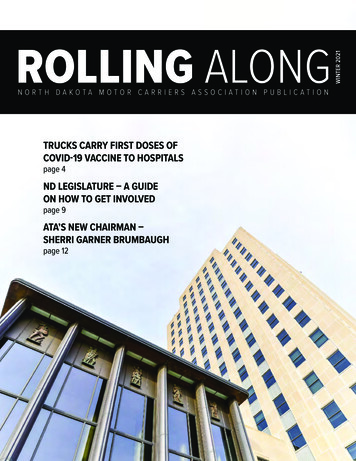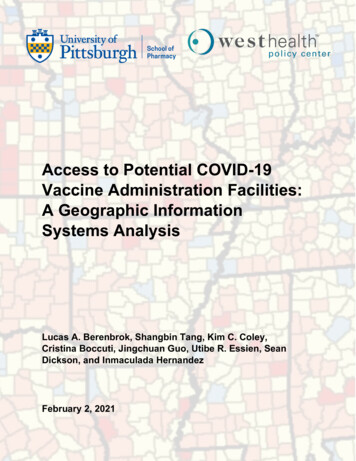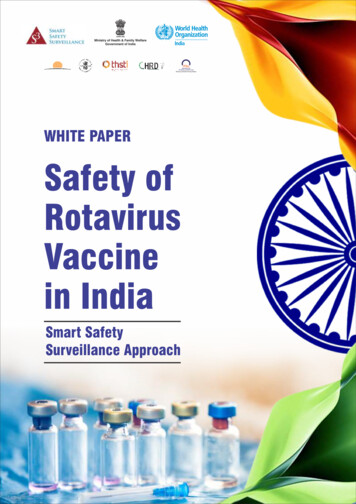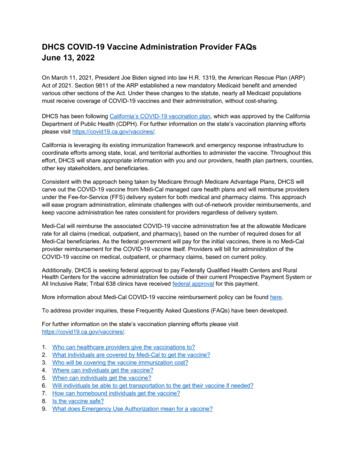
Transcription
DHCS COVID-19 Vaccine Administration Provider FAQsJune 13, 2022On March 11, 2021, President Joe Biden signed into law H.R. 1319, the American Rescue Plan (ARP)Act of 2021. Section 9811 of the ARP established a new mandatory Medicaid benefit and amendedvarious other sections of the Act. Under these changes to the statute, nearly all Medicaid populationsmust receive coverage of COVID-19 vaccines and their administration, without cost-sharing.DHCS has been following California’s COVID-19 vaccination plan, which was approved by the CaliforniaDepartment of Public Health (CDPH). For further information on the state’s vaccination planning effortsplease visit https://covid19.ca.gov/vaccines/.California is leveraging its existing immunization framework and emergency response infrastructure tocoordinate efforts among state, local, and territorial authorities to administer the vaccine. Throughout thiseffort, DHCS will share appropriate information with you and our providers, health plan partners, counties,other key stakeholders, and beneficiaries.Consistent with the approach being taken by Medicare through Medicare Advantage Plans, DHCS willcarve out the COVID-19 vaccine from Medi-Cal managed care health plans and will reimburse providersunder the Fee-for-Service (FFS) delivery system for both medical and pharmacy claims. This approachwill ease program administration, eliminate challenges with out-of-network provider reimbursements, andkeep vaccine administration fee rates consistent for providers regardless of delivery system.Medi-Cal will reimburse the associated COVID-19 vaccine administration fee at the allowable Medicarerate for all claims (medical, outpatient, and pharmacy), based on the number of required doses for allMedi-Cal beneficiaries. As the federal government will pay for the initial vaccines, there is no Medi-Calprovider reimbursement for the COVID-19 vaccine itself. Providers will bill for administration of theCOVID-19 vaccine on medical, outpatient, or pharmacy claims, based on current policy.Additionally, DHCS is seeking federal approval to pay Federally Qualified Health Centers and RuralHealth Centers for the vaccine administration fee outside of their current Prospective Payment System orAll Inclusive Rate; Tribal 638 clinics have received federal approval for this payment.More information about Medi-Cal COVID-19 vaccine reimbursement policy can be found here.To address provider inquiries, these Frequently Asked Questions (FAQs) have been developed.For further information on the state’s vaccination planning efforts please 7.8.9.Who can healthcare providers give the vaccinations to?What individuals are covered by Medi-Cal to get the vaccine?Who will be covering the vaccine immunization cost?Where can individuals get the vaccine?When can individuals get the vaccine?Will individuals be able to get transportation to the get their vaccine if needed?How can homebound individuals get the vaccine?Is the vaccine safe?What does Emergency Use Authorization mean for a vaccine?
10. How will safety be tracked once a COVID-19 vaccine is made available to the public?11. How will it work if healthcare providers are not contracted/credentialed with DHCS?12. What about Federally Qualified Health Centers (FQHCs), Rural Health Clinics, (RHCs) and TribalClinics?13. Will the vaccine administration fee be covered for all patients on Medi-Cal?14. Will immunization coverage apply to restricted scope group?15. What billing codes should be used?16. How will vaccine information be disseminated?17. What is the best way to ensure that patients return for their second shot?18. Where can healthcare providers enroll to become a vaccinator?19. What information should be given to patients upon vaccination?20. Where do I find general California guidance on COVID-19?21. Which children are eligible for a COVID-19 vaccine? Which children are eligible for a COVID-19booster? What about additional doses for immunocompromised children?22. Where do I find clinical information on the vaccines currently authorized in the United States?23. Should I bill for administration of the vaccine with both doses together, or separately for a 2-dosevaccine series?24. Will I be reimbursed for the administration of a single dose of a two-dose vaccine series (initial orfinal) if the Medi-Cal beneficiary I am administering to receives the other dose elsewhere? Whatabout a third dose or booster dose?25. What is the difference between an additional primary shot and a booster dose?26. Who is eligible to receive an additional primary shot?27. Who is eligible to receive a booster dose? Which booster should be administered?28. When billing for the administration of the COVID-19 vaccine for a Managed Care Plan enrollee, whatID should I list on the claim?29. How do I verify a beneficiary’s Medi-Cal eligibility if they do not have their BIC card or an SSN?30. What if a beneficiary’s BIC is lost or stolen?1. Who can healthcare providers give the vaccinations to?A. All providers must vaccinate individuals regardless of existing health coverage or the type ofcoverage. Providers are prohibited from balance billing or otherwise charging vaccine recipients.2. What individuals are covered by Medi-Cal to get the vaccine?A. All Medi-Cal beneficiaries and limited benefit groups including the Tuberculosis (TB), FamilyPlanning, Access, Care and Treatment (FPACT), and the COVID-19 Uninsured Group arecovered. All Californians can receive the vaccine at no cost.3. Who will be covering the vaccine immunization cost?A. The initial supply of COVID-19 immunizations will be federally purchased, meaning DHCS will notprovide Medi-Cal reimbursement for the vaccine itself. Please refer to the question below forinformation on the vaccine administration fee.
4. Where can individuals get the vaccine?A. Pharmacies, retail clinics, providers (including those enrolled in managed care plans), and anyother sites of care receiving and administering COVID-19 vaccinations.Additional information can be found on the CDPH Pages/Immunization/COVID-19Vaccine.aspxThe “My Turn” website can be used to schedule appointments.Additional information can be found at: https://myturn.ca.gov/5. When can individuals get the vaccine?Currently, vaccines can be given to every Californian age 5 years and older.The “My Turn” website tells Californians if they or their minors qualify to get the COVID vaccineand schedule appointments. Users can submit information about their age or their minors’ ageand can sign up to be notified over text or email when it’s their turn to get vaccinated and thenschedule appointments.6. Will individuals be able to get transportation to the get their vaccine if needed?A. For Medi-Cal managed care plan members:Yes. Members can call their managed care plan for assistance with booking a vaccineappointment and arranging transportation to that appointment. Managed care plans assist incoordination of vaccine services and transportation as needed.The My Turn website has a check box asking if the individual needs transportation to a vaccineappointment. If the individual checks this box, the individual will be notified that they will receive acall to schedule their vaccine appointment.A customer service representative (representative) from the California COVID-19Vaccination Services Information Line call center (call center) will contact the individual.If the individual needs transportation and has Medi-Cal, and is enrolled in a managed care plan,the call center representative will schedule their vaccine appointment and connect them totheir managed care plan for transportation coordination.B. For Medi-Cal Fee-for-Service beneficiaries:Yes. My Turn books the vaccine appointment (at least 5 business days after the call in order to providetime for transportation arrangement) and then provides the member with contact information to scheduletheir Medi-Cal Fee-for-Service transportation. For Non-Medical Transportation (persons who do not needassistance ambulating), Fee-for-Service beneficiaries (or the Call Center) can call any of the providers onthe below list of approved Non-Medical Transportation providers, or send an email toDHCSNMT@dhcs.ca.gov.Link to approved Non-Medical Transportation providers
ers.pdfFor Non-Emergency Medical Transportation (for non-ambulatory patients), beneficiaries normallywork with their medical provider, who can prescribe Non-Emergency Medical Transportation andput them in touch with a transportation provider to coordinate their ride to and from theirappointment. The San Diego DHCS Field Office can also assist by providing a list of NonEmergency Medical Transportation providers by location. The San Diego Field Office may bereached at (858) 495-3666.Additional information can be found here: nsportation.aspx7. Can homebound individuals get the vaccine?A. For Medi-Cal managed care plan members:Yes. After the managed care plan has connected with a member who requests the in-homevaccination, they are to refer the member to the MyTurn appointment system, and then instructthe member to book their appointment and check the appropriate box for in-home vaccination.The My Turn website has a check box asking if the individual is homebound and is unable toleave their home due to limited mobility or fragile health and needs a vaccine in their home. If theindividual checks this box, the call center representative will contact the individual and thenprovide the individual’s information to the Local Health Department. The Local Health Departmentwill then arrange for a medical team to visit the individual at home to vaccinate the individual andany family members.B. For Medi-Cal Fee-for-Service beneficiaries:Yes. The My Turn website has a check box asking if the individual is homebound and is unable toleave their home due to limited mobility or fragile health and need a vaccine in their home. If theindividual checks this box, the call center representative will contact the individual and thenprovide the individual’s Information to the Local Health Department. The Local Health Departmentwill then arrange for a medical team to visit the individual at home to vaccinate the individual andany family members.8. Is the vaccine safe?A. COVID-19 vaccines were tested in large clinical trials to make sure they meet safety standards.Many people were recruited to participate in these trials to see how the vaccines offer protectionto people of different ages, races, and ethnicities, as well as those with different medicalconditions.The Food and Drug Administration (FDA) has reviewed the vaccines for their safety andeffectiveness before granting Emergency Use Authorization (EUA) for their use. The U.S. Centersfor Disease Control (CDC) and its Advisory Committee for Immunizations (ACIP) has alsoreviewed the safety information of the approved vaccines.In addition, California formed a Scientific Safety Review Work Group to independently review thesafety and efficacy of the vaccines. Based on all these reviews, the vaccine is considered safe for
use in Californians. Please refer to the CDPH COVID 19 Questions and Answers page foradditional details.FDA and CDC will continue to monitor the safety of COVID-19 vaccines to make sure even veryrare side effects are identified. Health care providers are required to report certain adverse eventsfollowing vaccination to the Vaccine Adverse Event Reporting System (VAERS).On August 23, 2021, the FDA approved the commercial two-dose Pfizer-BioNTech COVID-19vaccine, Comirnaty, for use in people 16 years of age and older. An EUA still exists for additionalindications for the Pfizer-BioNTech COVID-19 vaccine.On January 31, 2022, the FDA approved the commercial two-dose Moderna COVID-19 vaccine,Spikevax, for use in people 18 years of age and older. An EUA still exists for additionalindications for the Moderna COVID-19 vaccine.CDC is also implementing a new smartphone-based tool called v-safe to check in on people’shealth after they receive a COVID-19 vaccine. When you receive your vaccine, you should alsoreceive a v-safe information sheet telling you how to enroll in v-safe. If you enroll, you will receiveregular text messages directing you to surveys where you can report any problems or adversereactions you have after receiving a COVID-19 vaccine.For more information regarding safety considerations for COVID-19 vaccines, please visit the“Safety” section of: Clinical Guidance for COVID-19 Vaccination CDCAdditional information can be found here: https://covid19.ca.gov/vaccines/9. What does Emergency Use Authorization mean for a vaccine?A. In certain types of emergencies, such as with the current public health emergency, the FDA canissue an emergency use authorization, or EUA, to provide more timely access to critical medicalproducts that may help during the emergency when there are no adequate, approved, andavailable alternative options.Under the EUA authority, the FDA evaluates requests for authorization very quickly using theevidence that is available, carefully balancing the risks and benefits of the product as we knowthem, in addition to evaluating other criteria. EUAs are in effect until the emergency declarationends but can be revised or revoked as needs change during the emergency, or as products meetthe criteria to become approved, cleared, or licensed by the FDA.Additional information can be found here: https://covid19.ca.gov/vaccines/ and CDPH COVID-19:Information for Laboratories10. How will safety be tracked?A. After a vaccine is approved for use via Emergency Use Authorization (EUA), scientists and healthprofessionals will continue to carefully monitor its use. The Vaccine Safety Datalink in the UnitedStates, which monitors many immunizations in California, is designed to report a safety problemin near real time so the public can be informed quickly of possible risks. Health care providers arerequired to report certain adverse events following vaccination to the Vaccine Adverse EventReporting System (VAERS).
When you receive your vaccine, you will also receive an information sheet telling you how toenroll in a program called v-safe that allows you to report problems or adverse reactions you haveafter receiving a COVID-19 vaccine to the Centers for Disease Control (CDC). Additionally, theFood and Drug Administration (FDA) and CDC will continue to carefully monitor the safety ofCOVID-19 vaccines to make sure that even very rare side effects are identified as early aspossible. These are some of the ways that will help detect previously undetected issues related tothe vaccines as early as possible.For more information regarding safety considerations for COVID-19 vaccines, please visit the“Safety” section of: Clinical Guidance for COVID-19 Vaccination CDC11. How will it work if healthcare providers are not contracted/credentialed with DHCS?A. The vaccine provider must be enrolled in Medi-Cal for purposes of obtaining reimbursement fromDHCS for the vaccine administration fee. Medi-Cal providers who administer the vaccine to MediCal beneficiaries will be reimbursed at the Medicare rate for the administration fee.Additional information can be found here: 12. What about Federally Qualified Health Centers (FQHCs), Rural Health Clinics, (RHCs) andTribal Clinics?A. DHCS will pay the applicable Prospective Payment System (PPS)/All Inclusive Rate (AIR) if thevaccination is administered during an in-person visit that meets the requirements of a billableoffice visit in the clinic setting. If the vaccine administration does not meet all of the requirementsof a billable visit (i.e. only vaccine administration), DHCS is seeking federal approval for theFQHCs and RHCs. Approval has been granted for Tribal 638 clinics to bill Medi-Cal FFS foradministering the COVID vaccine and be reimbursed the applicable dosage rate as noted above.13. Will the vaccine administration fee be covered for all patients on Medi-Cal?A. Yes. The vaccine administration fee will be covered for all Medi-Cal beneficiaries who haveMedi-Cal, including limited-scope and restricted-scope populations. Those who are duallyeligible for both Medicare and Medi-Cal will generally be covered by Medicare.Payment for the COVID-19 vaccine administration fee will be through the Medi-Cal Fee-forService delivery system for all covered populations, including those in Medi-Cal managedcare plans.Medi-Cal will reimburse the associated COVID-19 vaccine administration fee at the allowableMedicare rate for all claims, medical and pharmacy, based on the number of required dosesfor full-scope Medi-Cal beneficiaries. For restricted-scope Medi-Cal beneficiaries, providerswill need to follow the guidance issued by DHCS in April 2020 on Coverage of EmergencyCOVID-19 Inpatient or Outpatient Services.For vaccines administered on dates of service prior to and including March 14, 2021, MediCal will reimburse the associated COVID-19 vaccine administration fee at the previously
published maximum allowable reimbursement rate for providers based on the number ofrequired doses: The maximum allowable rate for a single-dose vaccine is 28.39; themaximum for a double-dose vaccine is 16.94 for the initial dose and 28.39 for the finaldose ( 45.33 total).For vaccines administered on or after March 15, 2021, Medi-Cal will set the maximumallowable reimbursement of the associated COVID-19 vaccine administration fee at 40.00per dose, regardless of vaccine manufacturer.14. Will immunization coverage apply to restricted scope group?A. All vaccination providers must provide the vaccine regardless of coverage. For restricted-scopeMedi-Cal beneficiaries, providers will need to follow the guidance issued by DHCS in April 2020on Coverage of Emergency COVID-19 Inpatient or Outpatient Services.15. What billing codes should be used?A. DHCS is using the American Medical Association Current Procedural Terminology or CPT codes for reporting of immunizations for COVID-19 for the medical and outpatient claim types.These CPT codes are unique for each COVID-19 vaccine and dose.Vaccine Name andDosagePfizer-BioNTech (30mcg/0.3 mL)Vaccine Code/DescriptionPfizer-BioNTech (10mcg/0.2 mL)Moderna (100mcg/0.5 mL)91307Moderna booster(50 mcg/0.25 mL)Janssen (5x1010 viralparticles/0.5 mL)91306913009130191303CPT VaccineAdministration Code0001A (1st dose)0002A (2nd dose)0003A (3rd dose)0004A (Booster)0071A (1st dose)0072A (2nd dose)0011A (1st dose)0012A (2nd dose)0013A (3rd dose)0064A (Booster)0031A (Single Dose)0034A (Booster)Additional information can be found here: esFor the pharmacy claim type, DHCS is using a combination of a National Drug Code (NDC) andSubmission Clarification Code (SCC) on electronic claims or an NDC and a Fill Number on paperclaims to uniquely identify both the vaccine and dose being administered.The most current direction regarding eligible populations and Medi-Cal billing guidelines are availablefor each currently approved vaccine here:https://files.medi-cal.ca.gov/pubsdoco/Pfizer BioNTech COVID19 /Moderna COVID19 /Janssen COVID19 Vaccine.aspx
Additional Medi-Cal billing information can be found at the COVID-19 Medi-Cal Response 9 response.aspx16. How will vaccine information be disseminated?A. DHCS will communicate updated immunization information to providers, stakeholders, healthplans, county partners, and the community through strategies, such as: Developing written guidance for health plans, including All Plan Letters, as it relates toimmunization distribution and reimbursement ratesProvider notices/bulletins on the Medi-Cal websiteGeneral information can be found here: covid19.ca.gov17. What is the best way to ensure that patients return for their second shot? What about a thirddose, or a booster shot?A. Providers are encouraged to explain the health benefits and outcomes associated withsupplementary shot administration. Before the patient leaves the office after their first dose,ensure they schedule an appointment for their second dose, and if applicable, third dose orbooster dose.18. Where can healthcare providers enroll to become a vaccinator?A. Pharmacies, retail clinics, providers, and any other sites of care must sign an agreement with theU.S. government to receive no- cost free supplies of the COVID-19 vaccine(s).Under the agreement, all providers must vaccinate individuals regardless of existing healthcoverage or the type of coverage. Providers are prohibited from balance billing or otherwisecharging vaccine recipients.More information is available below for providers interested in becoming part of the spx#19. What information should be given to patients upon vaccination?A. Prior to receiving a COVID-19 vaccine for an indication that has not received FDA-approval,patients must be provided with an Emergency Use Authorization Fact Sheet about the vaccine.When receiving a COVID-19 vaccine for an indication that has received FDA-approval, it is notnecessary to provide patients with an EUA Fact Sheet about the vaccine.After receiving the vaccine, patients must receive a vaccination card that identifies the brand ofvaccine administered and the date their second vaccination (if applicable) is due.For the latest information on FDA-approval of COVID-19 vaccines, please visit: COVID-19Vaccines FDA
For more information providers can email COVIDCallCenter@cdph.ca.gov or call (833) 502-1245,Monday through Friday, from 9 a.m. to 5 p.m.20. Where do I find general California guidance on COVID-19?A. There are two California websites that offer general guidance on COVID-19. These are theCalifornia Coronavirus Response website and the California Department of Public Health website.Check both websites frequently, as resources are regularly updated and added. Below are theweb addresses of each. The California Coronavirus Response website is: covid19.ca.gov. The California Department of Public Health website is: cdph.ca.gov/COVID19 The Centers for Disease Control website is: 1. Which children are eligible for a COVID-19 vaccine? Which children are eligible for a COVID-19booster? What about additional doses for immunocompromised children?A. CDC recommends everyone age 5 years and older get a COVID-19 vaccine to help protectagainst COVID-19. Currently, children and teenagers under 18 years old are eligible only for thePfizer-BioNTech COVID-19 vaccine.Note that the Pfizer-BioNTech COVID-19 primary vaccine series for most children 5 through 11years of age is administered as a two-dose series, 3 weeks apart, but is a lower dose (10micrograms) than that used for individuals 12 years of age and older (30 micrograms).For the latest information on COVID-19 vaccines for children and teens, please visit: COVID-19Vaccines for Children and Teens CDCFor the latest information and resources for the Pfizer-BioNTech COVID-19 vaccine for children –including information on dosing and vaccine schedule – please visit Pfizer-BioNTech COVID-19Vaccines CDCCDC also recommends that everyone 12 years and older should get a COVID-19 boostershot.For the latest information on COVID-19 booster shots, please visit: COVID-19 Vaccine BoosterShots CDCModerately or Severely Immunocompromised ChildrenFor the latest information on additional primary shots and booster shots for someimmunocompromised people including children, please visit: COVID-19 Vaccines for Moderatelyor Severely Immunocompromised People CDCAdditional information can be found here: https://covid19.ca.gov/vaccines/ nes/index.html
22. Where do I find clinical information on the vaccines currently authorized in the United States?A. Additional clinical information can be found at uct/clinical-considerations.html23. Should I bill for administration of the vaccine with both doses together, or separately for a 2dose vaccine series? What about a third dose or booster dose?A. Dose administrations may be billed separately, or together on the same claim, whichever fits theprovider’s billing preferences and practices. Providers are reminded to check the Medi-CalProvider Manual to ensure claims remain timely.24. Will I be reimbursed for the administration of a single dose of a two-dose vaccine series (initialor final) if the Medi-Cal beneficiary I am administering to receives the other dose elsewhere?What about a third dose or booster dose?A. There is no requirement for the same provider to administer each dose. Each dose is separatelyreimbursable. However, for mRNA vaccines, the manufacturer of the doses administered to aMedi-Cal beneficiary should, if possible, remain consistent between the first and second dose(and between the first, second, and third dose for moderately and severely immunocompromisedpeople aged 5 years) regardless of the administering provider. A booster dose of any of theavailable COVID-19 vaccines may be administered as a heterologous booster dose followingcompletion of primary vaccination series with a different available COVID-19 vaccine.25. What is the difference between an additional primary shot and a booster dose?An additional primary shot of a COVID-19 vaccine is administered for individuals with weakenedimmune systems at least 28 days after the second dose of an mRNA vaccine, to help protect theseindividuals who may not have had a strong enough response to the first two doses.People are considered to be moderately or severely immunocompromised if they have: Been receiving active cancer treatment for tumors or cancers of the blood Received an organ transplant and are taking medicine to suppress the immune system Received a stem cell transplant within the last 2 years or are taking medicine to suppress theimmune system Moderate or severe primary immunodeficiency (such as DiGeorge syndrome, Wiskott-Aldrichsyndrome) Advanced or untreated HIV infection Active treatment with high-dose corticosteroids or other drugs that may suppress your immuneresponseA booster dose, designed to help individuals maintain their immunity for longer, is administered atleast 2 months after the individual receives the Johnson & Johnson’s Janssen (J&J/Janssen) COVID19 vaccine, or at least 5 months after completing the initial series of the Pfizer-BioNTech or ModernaCOVID-19 vaccines.26. Who is eligible to receive an additional primary shot?
A. For information on who is eligible to receive an additional primary shot, please visit: COVID-19Vaccines for Moderately or Severely Immunocompromised People CDC27. Who is eligible to receive a booster dose? Which booster should be administered?For the latest information on who can get a booster shot and which booster should be administered,please visit: COVID-19 Vaccine Booster Shots CDCModerately or Severely Immunocompromised PeopleFor the latest information on booster shots for some immunocompromised people, please visit:COVID-19 Vaccines for Moderately or Severely Immunocompromised People CDC28. When billing for the administration of the COVID-19 vaccine for a Managed Care Plan enrollee,what ID should I list on the claim?A. Because claims for the administration of the COVID-19 vaccine(s) are submitted to Medi-Cal feefor-service fiscal intermediary for processing, providers must use the ID listed on a patient’sBeneficiary Identification Card (BIC). A Managed Care Plan ID is not recognized in the Medi-Calfee-for-service system, so providers who bill using this ID may experience denials.29. How do I verify a beneficiary’s Medi-Cal eligibility if they do not have their BIC card?A. The patient should contact the county welfare office for BIC replacement. The county welfareoffice can also provide the beneficiary with their BIC, over the phone, to facilitate the immediaterendering of services, if needed.30. What if a beneficiary’s BIC is lost or stolen?A. The patient should contact their county welfare office for BIC replacement.Additional ination-ProgramInterim iles.medi-cal.ca.gov/pubsdoco/COVID19 response.aspx
19/vaccination-provider-support.html
Transportation-Providers.pdf For Non-Emergency Medical T ransportation (for non-ambulatory patients), beneficiaries normally work with their medical provider, who can prescribe Non-Emergency Medical Transportation and put them in touch with a transportation provider to coordinate their ride to and from their appointment.
